SCOTTISH POLICE FEDERATION CONFERENCE 2023 DOCUMENTATION
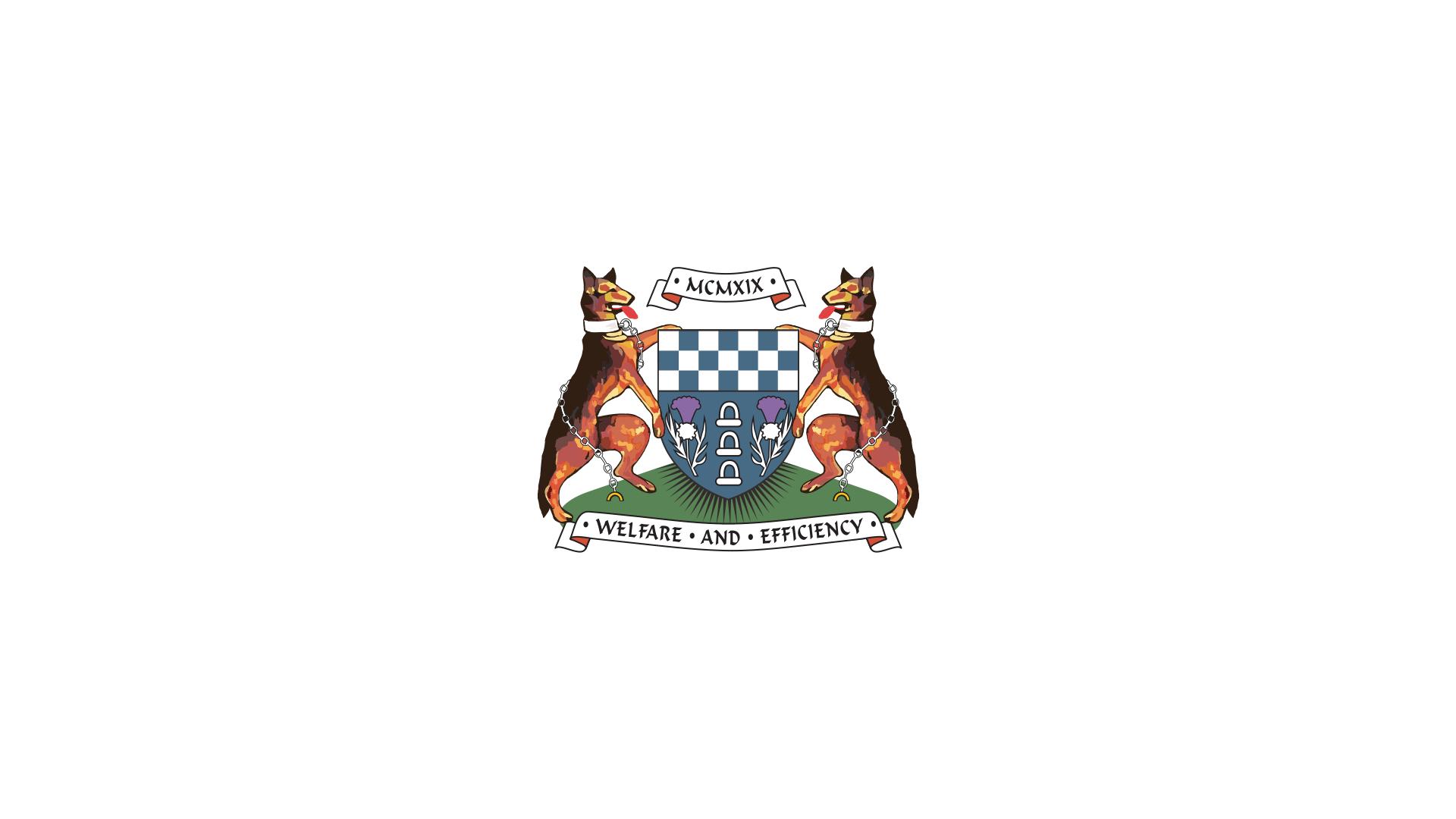
SHOULD YOU REQUIRE A PRINTED COPY OF THIS DOCUMENT PLEASE SPEAK TO YOUR AREA SECRETARY

INDEX
97th Conference Minutes 2021
Joint Central Committee Report 2019-21
2023 CONFERENCE DOCUMENTATION
P1-4 P5-7 P8-10 P11-12 P13-16 P17 P18 P19-22
P23-24 P25
2023 Conference Programme/Agenda
Rules made by the Joint Central Committee for the Governance and administration of the Central Conference
Standing Orders for Central Conference
The Police Federation (Scotland) Regulations 2013 –Part 5

In Memory
List of Delegates
Chairmen of the Joint Central Committee since 1919
General Secretaries of the Joint Central Committee since 1919
P26-28
2023 Speaker Biographies
SCOTTISH POLICE FEDERATION

Established by Act of Parliament
NINETY-SEVENTH CONFERENCE
Online
24 April 2021
1 Roll Call
The Chair noted the number of delegates in the hall.
2 Chair’s Welcome and Opening Remarks
The Chair welcomed everyone to the 97th Conference of the Scottish Police Federation and declared Conference open. He said the past year and the global pandemic had been unique and difficult for everyone and members had responded to the challenges in a magnificent fashion. In addition, as elections to the Scottish Parliament would take place on Thursday 6 May 2021, Conference was in a period of ‘purdah’ where specific restrictions on communications activity were in place for politicians The pandemic and ‘purdah’ meant that Conference was very different this year and he hoped representatives would understand these reasons for it being held by video conferencing and the restricted nature of the Agenda.
The Chair asked representatives to respect a minute’s silence for members who had passed away since the last Conference
3 Adoption of Rules & Standing Orders
The Rules and Standing Orders were adopted.
4 Minute of 96th Conference
The Minute of the Ninety Sixth Conference was moved, seconded and adopted as a true record of the Conference
5 Joint Central Committee Report
The General Secretary delivered a presentation on the work of the Joint Central Committee (attached) He said he would report on Internal matters, PSoS, SPA, External matters, Scottish Government, Scottish Parliament, HMICS, Pan UK matters, UKPPCF, International matters, EuroCOP and ICPRA
1
Internal - He said, internally, the SPF had received 14,406 phone calls (not including calls to mobiles), around 140 calls per week. Over 276,000 emails were received from external sources, about 375 per day. He said representatives had attended 120 formal organizational business meetings and in addition, weekly Covid meetings.
Legal - The General Secretary reported that since last Conference, legal expenditure stood at £2,236,485 72 He said 490 Officers had been legally assisted; there was 356 live ongoing cases and 83 cases had been settled. He explained that £4,268,210.18 had been obtained in settlements for members.
He reported briefly on the Allard case, a Supreme Court which was being watched internationally and the Sheku Bayoh Public Inquiry.
Conduct - He said there had been 119 Misconduct Investigations (85 Gross), 46 Suspensions, 4 Dismissals and 16 Resignations.He also gave a brief overview of the Angiolini Review.
Equality – The General Secretary covered Reckoning of Pay (additional hours); Homeworking / Pregnancy / COVID; Detailed Tribunal Summaries and Diversity Liaison.
Health and Safety – He told Conference there had been 49 Accident Investigations, he reported on the work of the SPF Panel of Experts; Recording COVID exposures; COVID H&S, PPE, HSE and Naloxone.
Scottish Police Consultative Forum – The General Secretary reported on the Police Leadership Development Programme (PLDP), Accelerated Leadership Programme (ALP), Legal Advice & Assistance and a proposed Compensation scheme
PNB – The General Secretary reported on Shared Parental Leave / KIT (2019/01); Additional Travel (2019/02); ‘Handbook’ (www.PNB.scot ); TWG; Inspectors Working Hours; COP 26; Away from Home; Overseas; EWG; Increased Maternity Pay
Pay – The General Secretary reported on the pay claim which was ongoing and included Toil & Overtime for Inspectors; Narrowing the Pay Gap between Ranks; 2 Additional PHs; RD x 2 (10 days) RD x 1.5 (21 days); An in service Compensation Scheme; and a 1% uplift for Superintendents
6 Martin Evans, Chair, Scottish Police Authority
The Chair welcomed Mr Evans and wished him well in his relatively new appointment. He interviewed Mr Evans on a wide range of subjects about the work of the SPA and its relationship with the Police Service of Scotland. Mr Evans spoke about vaccinations, bonus payments and the Campbell Christie Award presented to the C3 CALM Project. The Chair offered Mr Evans every possible assistance in his role which was central to the success of policing.
2
Iain Livingston QPM, Chief Constable
The Chair interviewed the Chief Constable on subjects including the depth of police activity in society and its central role the response to the pandemic. He also mentioned how the past year had indicated how we might do things differently in the future in relation to video conferencing and responding to certain types of incidents. The Chair and Mr Livingston discussed cleaning regimes, vaccinations, bonus payments, Taser, inspector’s working hours, cyber crime, the police estate and fleet, and police officer numbers
8 Panel Discussion:
Chief Constable Iain Livingston QPM
SPA Chair Martyn Evans
SPF General Secretary Calum Steele followed by Q&A Session
The panel discussed a wide range of policing topics and answered questions on the urgent requirement for driver training and why naloxone was being prioritized over officer safety and first aid training. They also addressed questions on why suspected drug dealers were released from custody; the covid risk to officers breaking up lockdown parties; the regime in police offices; police pay; inspector’s working hours and rank ratios.
9 Inputs from political parties
As the Chair had explained in opening Conference, ‘purdah’ was in place and in advance of the Scottish parliamentary elections politicians were restricted in the types of communication they could engage in. For this reason, short pre-recorded videos from Alba, Conservatives, Greens, Labour, Liberal Democrats & SNP were shown to Conference. All parties had been asked to address the same two questions:
What do you see as the priorities for policing in the next parliamentary term? Why should police officers should vote for your party?
10 Health & Safety
Guest speaker, Professor Sir Harry Burns. Professor Burns one of the SPF’s panel of experts gave a full and detailed account on the Covid 19 pandemic and the future implications for police officers.
11 Conduct
Guest speakers, Professor Peter Watson & Victor Marshal OBE spoke on the topic of Conduct v Performance. Professor Watson alluded to the Dame Ailish Angiolini report, he highlighted the positives to take from the report and the lessons that could be learnt but he also gave his views on the way forward.
7
3
James Thomson, Assistant to General Secretary H&S launched the SPF’s Flexible Working Guide. Conference heard from Jennie MacFarlane, Iain Gray, Christopher Thomson, Laura Thompson and Megan Bradley who all gave an insight on their personal experiences on Flexible working arrangements
13 Q & A Session
Calum Steele, General Secretary, David Hamilton, Chair, David Kennedy, Deputy General Secretary & Brian Jones, Vice Chair took questions from Representatives from around the country on pay negotiations; ‘Protect the Protector Legislation’, bonus payments; SPF IT provision; naloxone; fleet; tasers; 1919 magazine; COP26; and body worn videos
14 Chair’s Closing Remarks
The Chair thanked everyone for their attendance and inputs and closed Conference.
12 Equality
4
JOINT CENTRAL COMMITTEE REPORT
2019-21
(Calum Steele)
(General Secretary)
Activities
Internal – PSoS – SPA
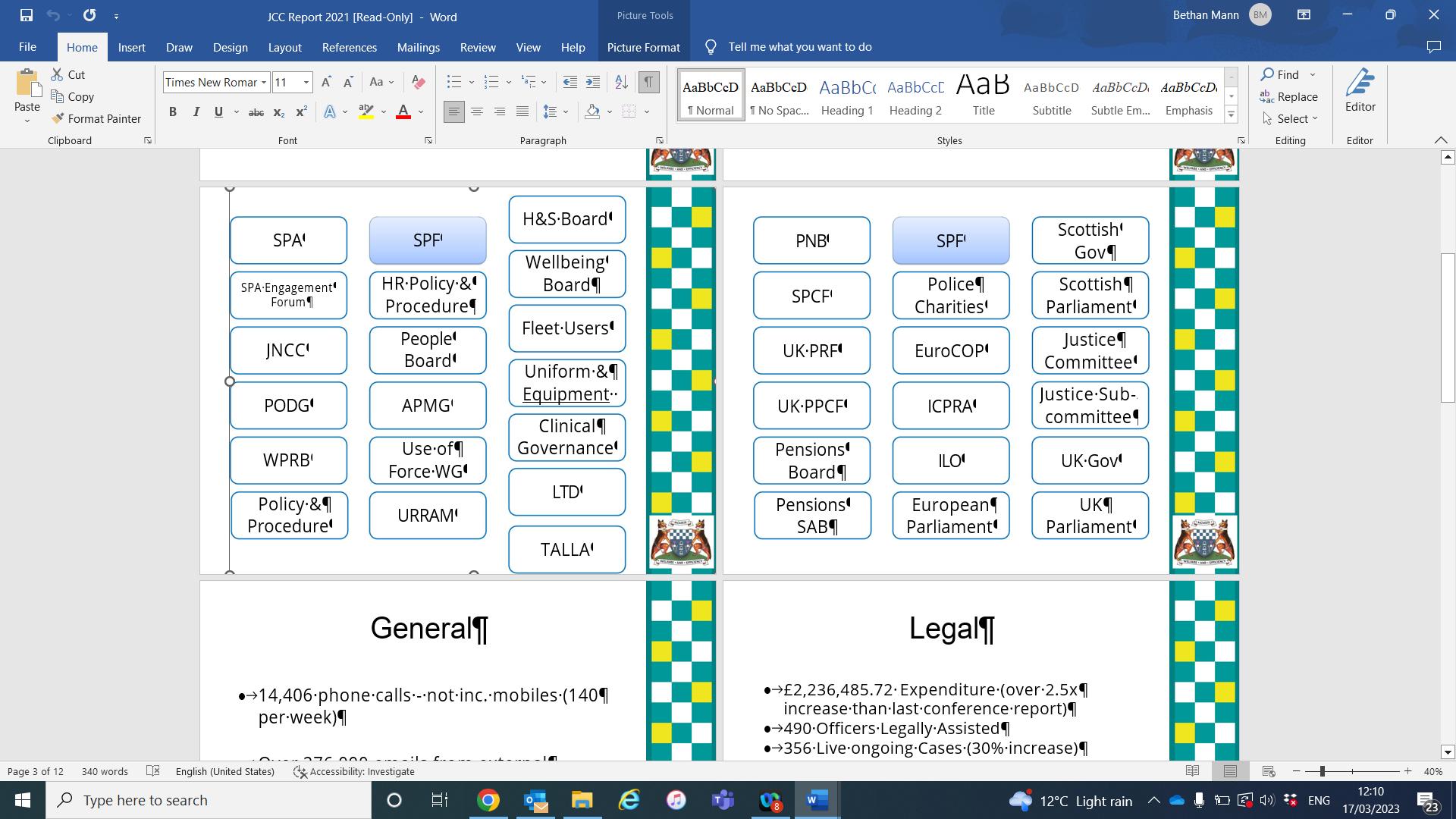
External – Scottish Government

– Scottish Parliament
– HMICS
Pan UK UKPPCF
5
General Legal Conduct
4,406 phone calls - not inc. mobiles (140 per week)
Over 276,000 emails from external sources (375 per day)
120 formal organizational business meetings
Weekly Covid meetings
£2,236,485.72 – Expenditure (over 2.5x increase than last conference report)
490 Officers Legally Assisted
356 Live ongoing Cases (30% increase)
83 Cases Settled
£4,268,210.18 in settlements (over 12x increase)
Allard
Supreme Court – case being watched internationally
Sheku Bayoh Public Inquiry
119 Misconduct Investigations
85 Gross
46 Suspensions
4 Dismissals
16 Resignations
Angiolini Review
Equality
Reckoning of Pay (additional hours)
Homeworking / Pregnancy / COVID
Detailed Tribunal Summaries
Diversity Liaison
Angiolini Review
H&S
49 Accident Investigations
SPF Panel of Experts
Recording COVID exposures
COVID H&S, PPE, HSE
Naloxone
6
Police Leadership Development Programme (PLDP)

Accelerated Leadership Programme (ALP)
Legal Advice & Assistance
Compensation
Shared Parental Leave / KIT (2019/01)
Additional Travel (2019/02)
·Handbook’ (PNB.scot)
TWG
– Inspectors Working Hours
– COP 26
– Away from Home
Overseas
3.25%, 3.25% or 6.00%
Toil & Overtime for Inspectors
Narrow Pay Gap between Ranks
2 Additional PHs
RD x 2 (10 days)
RD x 1.5 (21 days)
In service Compensation Scheme
Feb 2021 - 1% up to Supts
EWG
SPCF PNB
PAY
2020 7
–
– Increased Maternity Pay
JUNE
SPF CONFERENCE 2023
Trump Turnberry
Tuesday 28th - Thursday 30th March 2023
Tuesday 28th March
9am 10.15am 11am 11.30am 1pm 2pm 3.15pm 3.30pm 5.30pm 7pm 8pm
Conference commences
Scene setting for the next 2 days
David Kennedy, General Secretary, Scottish Police Federation
SPF Joint Central Committee Executive Report
'Human Rights do police officers have any?'
Craig Sandison, Lord Sandison
Scottish Judge and Senator of the College of Justice
Refreshment break
Conference Speech by David Threadgold, Chair, Scottish Police Federation

Response with Question and Answer Session
Sir Iain Livingstone QPM, Chief Constable Police Scotland
Lunch
Keynote Presentations
Dr Marshall Garrett
Professor Sir Harry Burns
Refreshments / Comfort break
Facilitated discussions
Close Drinks in the Grand Tea Lounge
Evening Meal
8
Wednesday 29th March
9.30am 11am 11.30am 12.45pm 1.30pm 5pm 7.30pm
Conference commences
Conference Speech by David Threadgold, Chair, Scottish Police Federation

Response by Cabinet Secretary for Justice and Veterans, Keith Brown MSP
Refreshment break
Separates Conference in 3 sessions
Constables Sergeants Inspectors
Lunch Workshop sessions
Close Evening meal
Thursday 30th March
9.30am 12.30pm
Conference commences
Keynote presentations
Ken Pennington
Independent consultant on policing, counter-terrorism and human rights
John Kennedy
Managing Director at The Forensic Science Bureau
Lunch and close
9
2023 CONFERENCE AGENDA
1 Roll Call
2 Welcome and Opening Remarks
3 Adoption of Rules and Standing Orders
4 Minutes of 97th Joint conference
5 Joint Central Committee Report
6 Craig Sandison, Lord Sandison Scottish judge and Senator of the College of Justice - Human Rights do police officers have any?
7 Conference speech by David Threadgold, Chair of the SPF
8 Panel discussion with Chief Constable Sir Iain Livingstone QPM, followed by a Q&A session
9 Dr Marshall Garrett
10 Professor Sir Harry Burns
11 Facilitated discussions – follow on from Crieff Hydro
12 Conference speech by David Threadgold, Chair of the SPF
13 Response from Cabinet Secretary for Justice and Veterans, Keith Brown MSP
14 Separates Conferences
15 Workshops
Conduct – Lynne Gray, Deputy Secretary West Area Committee Equality – Amanda Buchanan, Legal Director. Levy & McRae Insurance – Les Gray, Phillip Williams & Company H&S – Lifelines Scotland with Leni Rademacher
16 Ken Pennington - Independent consultant on policing, counter-terrorism and human rights
17 John Kennedy - Managing Director at The Forensic Science Bureau 18 Chairs Closing remarks
10
RULES MADE BY THE JOINT CENTRAL COMMITTEE FOR THE GOVERNANCE AND ADMINISTRATION OF THE CENTRAL CONFERENCE
PART 5
The Joint Central Conference
Membership
14 The joint central conference’s members must
(a) consist of every member elected to an area committee (including those who are also members of the joint central committee by virtue of being elected to one of the central committees); and
(b) have equal voting rights (where applicable) during its proceedings.
Proceedings
15(1) The joint central conference may only meet once in every two calendar years, each meeting lasting not more than three days or, with the Scottish Ministers’ consent, four days.
15(2) The joint central conference’s members may meet separately, according to their rank, for the purpose of discussing matters of specific interest to constables holding the rank of inspector, sergeant and constable, respectively
15(3) A meeting mentioned in paragraph (2)—
(a) may be held only
(i) if it takes place during the time allowed for an ordinary meeting of the joint central conference; or
(ii) with the chief constable’s consent; and

(b) must not last more than half a day.
15(4) The joint central conference must act in accordance with any rules made under regulation 6 which regulate, or relate to, its functions and proceeding
11
Police Federation (Scotland) Rules

Proceedings of Central Conferences (regulations 5 & 14)
Rule 12
12.1 There shall be constituted a Joint Central Conference and where desired by an individual rank Committee or Committees, rank specific Central Conferences.
12.1.1 A rank Central Conference can only take place if not less than 3 months’ notice is provided to the General Secretary.
12 2 Every Area Committee representative shall be a delegate to the Joint Central Conference and where held, their specific rank Central Conference.
12.3 Each Conference may consider Motions which have been submitted by the appropriate Area Committee or the appropriate Central Committee as may be compiled by a sub-committee under Rule 11. Such Motions shall be passed or rejected and, if passed, they shall be remitted to the appropriate Central Committee for further consideration and action as appropriate.
12.4 Delegates at a Central Conference shall have one vote each.
12.5 Subject to the provisions of Rule 12.6 the Officials provided for by Rules 3.1, 6.1, 10.1 and 10.1.1 do not have a vote at any Central Conference.
12.6 The Chairperson at any Central Conference shall have a casting vote in accordance with Rule 5 5
12.7 Voting shall take place in a manner determined by the Joint Central Committee.
12
STANDING ORDERS FOR CENTRAL CONFERENCE
Roll Call
1.1 A roll call shall be taken at the start of each Conference day.
1 2 Where received, apologies for non-attendance shall be recorded
1.3 Any member submitting apologies must do so in writing to the Chairman prior to the commencement of Conference.
1 4 Any member who fails to attend and does not tender apologies shall be recorded as absent
Order of Business
2.1 The programme for Conference will be determined by the Conference Management Committee and detailed in the final agenda
2.2 The order of business for Conference shall be determined by the Chairman.
Motions and Amendments
3.1 Motions submitted for consideration must have been considered and supported by the relevant Area Committee or Subject Committee.

3 2 An explanatory note may accompany any motion and where submitted must be no more than 100 words.
3.3 Motions for Conference shall be accepted, rejected, or remitted to the Central Committee for further consideration by the Conference Management Committee.
3.4 The first proposition on any particular subject shall be known as the original motion and all succeeding propositions on that subject shall be called amendments.
3.5 No amendment shall be accepted which is a direct negative of the original motion, or which does not preserve the substance of such motion
3.6 Every motion or amendment must be moved by a delegate from the Committee in whose name the motion or amendment stands on the agenda. After being seconded, discussion will continue.
3.7 When an amendment is moved to an original motion no further amendment shall be discussed until the first amendment is disposed of, but notice of any further amendment must be given before the first amendment is put to the vote.
13
3.8 A member shall not move or second more than one amendment on any motion.
3 9 If an amendment be carried, it displaces the original motion and itself becomes the substantive motion, whereupon any further amendment relating to any portion of the substantive motion may be moved, provided it is consistent with the business and has not been covered by an amendment or motion which has been previously rejected.
3 10 After the vote on each succeeding amendment has been taken, the surviving proposition shall be put to the vote as the main question, and if carried shall then become a resolution of conference.
3.11 Except where included on the Conference agenda, amendments, addenda, or riders to motions will not be accepted unless approved by the Chairman
Speakers
4.1 Any member wishing to speak on any motion shall intimate to the Chairman, his or her desire to speak on the motion before the motion is moved
4.2 Intimation shall be provided to the Chairman, through the submission of a speakers card. The intimation shall indicate if the speaker is for or against the motion.
4 3 No speakers card shall be accepted for a motion under discussion once that motion has been moved.
4.4 The order of the speakers shall be determined by the Chairman.
4 5 Speakers shall address the Chairman and shall first state their name and the Area Committee to which they belong or post which they hold.
Speeches
5.1 No member shall be allowed to speak more than once on any motion under discussion except the mover of the original motion or a member requesting a point of information. But on an amendment being moved, any member even though they have spoken on the original motion, may speak again on the amendment.
5.2 Except by permission of the Chairman no member shall speak for more than five minutes at one time other than the mover who may speak for ten minutes.
5.3 Notwithstanding the above and with due regard to the number of speakers on any motion, The Chairman may at his or her discretion extend or curtail the time for any speech provided that no speaker shall have less time to speak than any other; and providing the mover shall have a speaking time of double that provided.
5.4 Members wishing to raise points of order must do so immediately after the alleged breach has occurred
5.5 Any member may formally second any motion or amendment and reserve their speech until a later period in the debate.
14
Right of Reply
6 1 The mover of the original motion shall, if no amendment be moved, have the right to reply at the close of the debate upon such motion.
6.2 When an amendment is moved they shall be entitled to speak thereon in accordance with Standing Order 5.1 and at the close of the debates on such amendment shall reply to the discussion, but shall introduce no new matter
6.3 The question shall then be put to the vote immediately, and under no circumstances shall any further discussion be allowed once the question has been put from the Chairman. The mover of an amendment shall not be entitled to reply.
Withdrawals
7.1 No motion or amendment which has been accepted by the Joint Central Committee shall be withdrawn without the consent of two-thirds of Conference.
Closing the Debate
8.1 Next Business: The motion for ‘next business’ may be proposed and seconded only by members who have not previously spoken at any time during the debate.
8.1.1 No speeches shall be allowed and upon acceptance of the motion by Conference the Chairman will move to the next business on the Order Paper without any further discussion, or vote being taken.
8 1 2 When such motion is moved the delegate shall first state their name and the Area or Subject Committee to which they belong.
8.2 Adjournment of the Question: Any member who has not already spoken during the debate may move the adjournment of the question under discussion, but must confine their remarks to the question of the adjournment and must not discuss any other matter.
8.2.1 The mover of the motion upon which the adjournment has been moved shall be allowed the right to reply on the question of the adjournment, but such reply shall not prejudice their right of reply on their own motion
8.2.3 The time for the question to be re-introduced shall be determined by the Chairman.
8.3 Moving to the Vote: The motion for ‘moving to the vote’ may be proposed and seconded only by members who have not previously spoken at any time during the debate
8.3.1 No speeches shall be allowed.
8.3.2 In event of the ‘moving to the vote’ being carried, the mover of the original motion shall have the right to reply in accordance with Standing Order No. 6.1 before the vote is taken.
8.3.4 When such motion is moved the delegate shall first state their name and the Area or Subject Committee to which they belong.
15
Chairman’s Ruling
9 1 If the Chairman rises to call a member to order, or for any other purpose connected with the proceedings, the member speaking shall thereupon resume their seat, and no other member shall rise until the Chairman has concluded.
9.2 The ruling of the Chairman on any questions shall be final. Challenge can be made on points of order only and then must be supported by not less than four delegates and will not be successful unless two-thirds of Conference supports the challenge.
Misconduct
10 1 If any member interrupts another while addressing the meeting or uses abusive or profane language, or causes disturbance at any of the meetings, and refuses to obey the Chairman when called to order, they shall be named by the Chairman. They shall thereupon be expelled from the conference and shall not be allowed to enter again until an apology satisfactory to the conference is given.
Absence without Leave of the Chairman
11.1 Attendance at all sessions of Conference is mandatory and no member shall absent themselves or leave the meeting before its conclusion without the permission of the Chairman. The provisions of Regulation 15 of the Police (Scotland) Regulations 2013 apply
Suspension of Standing Orders
12.1 In the event of any matter of urgency the Chairman may propose or accept a motion for the suspension of Standing Orders
12.2 The member moving such suspension must clearly state the nature and urgency of their business, the numbers of Standing Orders affected, and the length of time (not exceeding 30 minutes) they desire such suspension to last
12.3 At the option of Conference, a further extension may be allowed, but no suspension shall take place unless Conference agrees by a two thirds majority of the votes cast vote in favour of the motion.
16
THE POLICE FEDERATION (SCOTLAND) REGULATIONS 2013

Regulation 5
Structure
5 The Federation must establish
(a) a joint central committee (consisting of three central committees, sitting together as a joint committee);
(b) such number of area committees as is determined in accordance with regulation 11(1)(a); and
(c) a joint central conference
PART 5
The Joint Central Conference
Membership
14 The joint central conference’s members must
(a) consist of every member elected to an area committee (including those who are also members of the joint central committee by virtue of being elected to one of the central committees); and
(b) have equal voting rights (where applicable) during its proceedings.
Proceedings
15(1) The joint central conference may only meet once in every two calendar years, each meeting lasting not more than three days or, with the Scottish Ministers’ consent, four days.
15(2) The joint central conference’s members may meet separately, according to their rank, for the purpose of discussing matters of specific interest to constables holding the rank of inspector, sergeant and constable, respectively.
15(3) A meeting mentioned in paragraph (2)
(a) may be held only
(i)if it takes place during the time allowed for an ordinary meeting of the joint central conference; or
(ii) with the chief constable’s consent; and
(b) must not last more than half a day
15(4) The joint central conference must act in accordance with any rules made under regulation 6 which regulate, or relate to, its functions and proceedings.
17
IN MEMORY OF THOSE WE HAVE LOST
It is with the deepest sadness that we have to report to you of the death of following colleagues in the past 24 months:-

NORTH
Jack Calvert
Kevin Heafey
EAST
Laura Carter Black
James Davenport
Aiden Joyce
Jason Kemp
William McAteer
WEST
Alan Frame
Gordon Humphries
John Traynor
Katharine Walsh
Lest we forget
18
NON VOTING DELEGATES
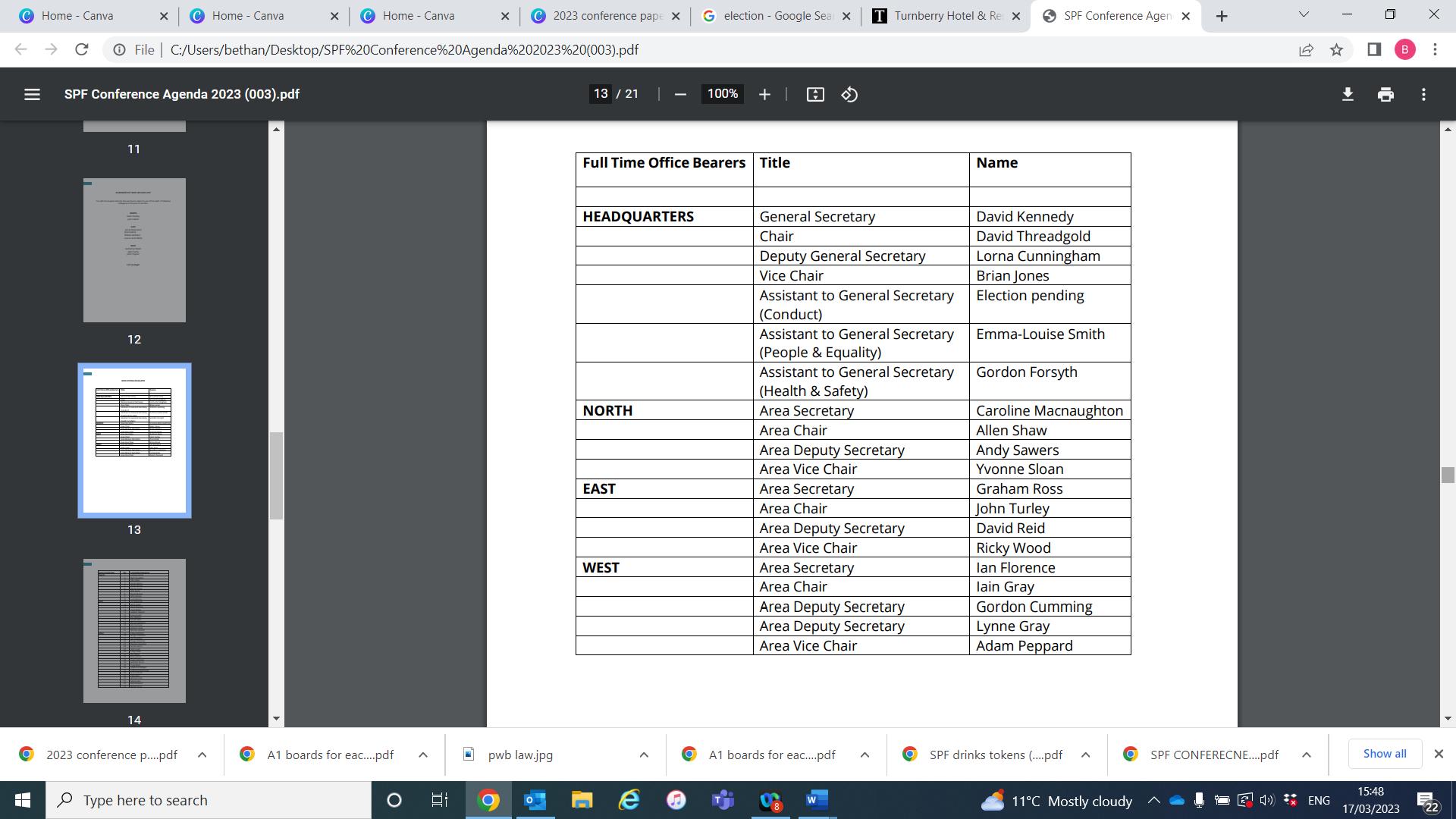

19
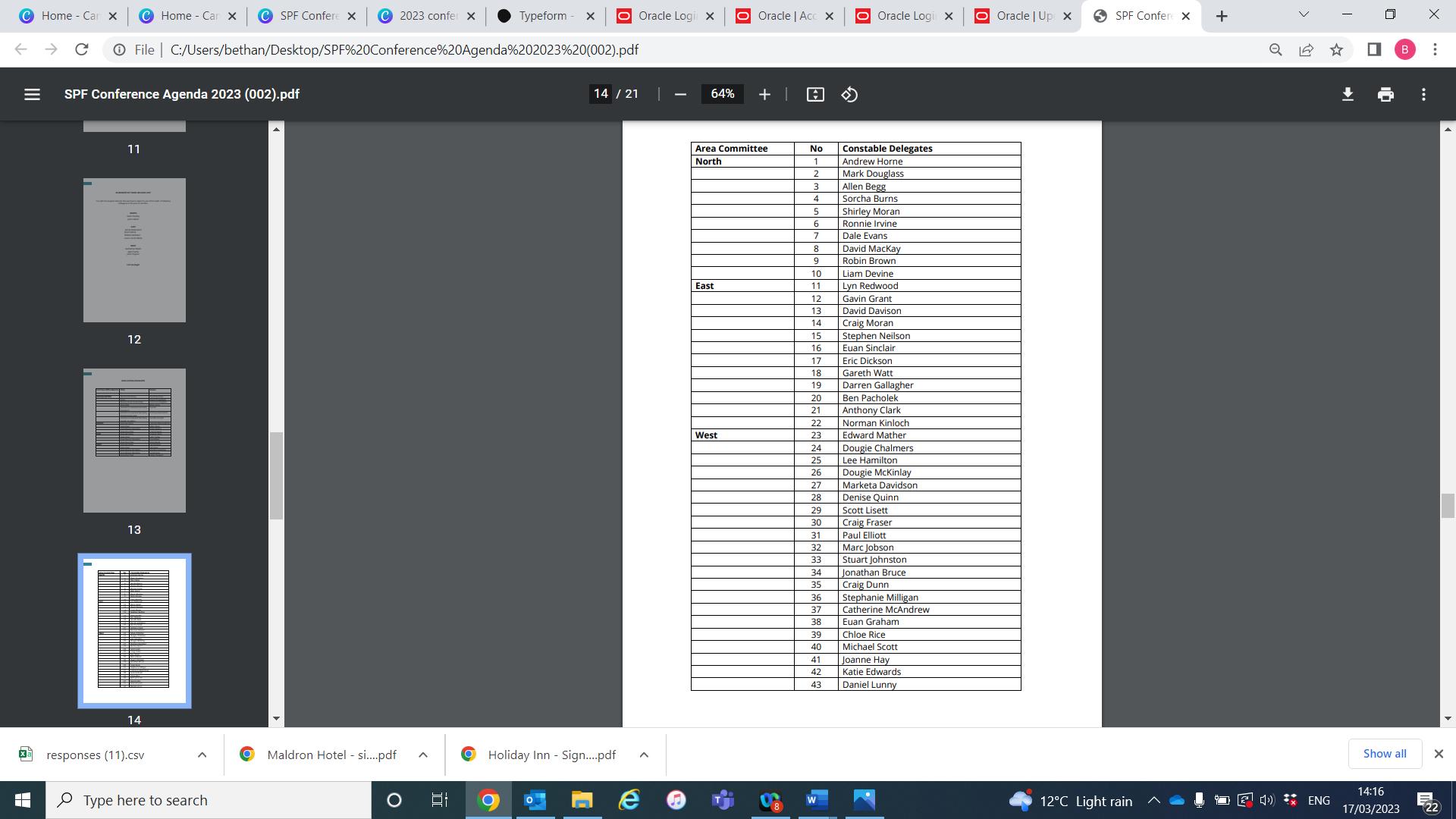
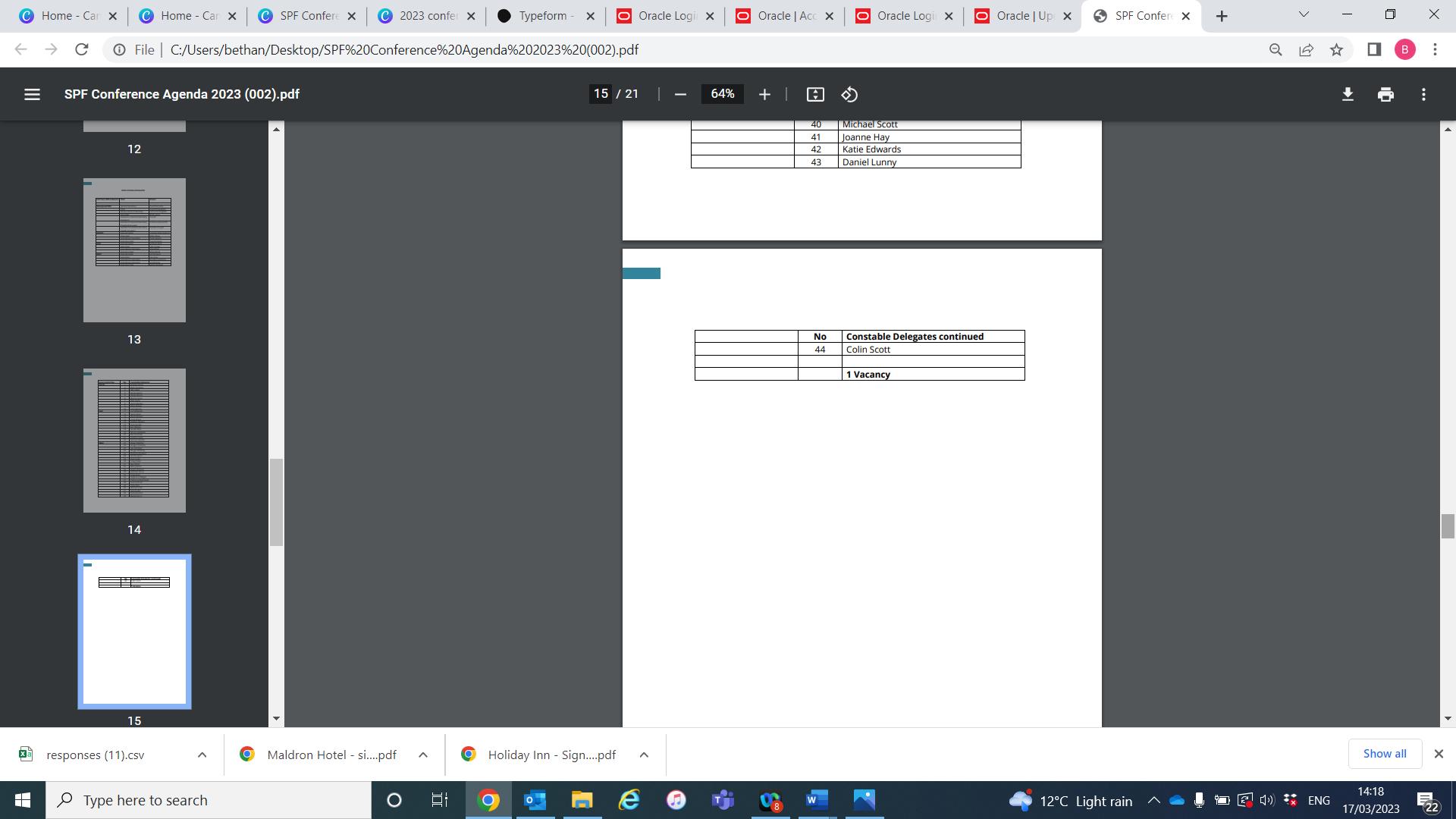
20
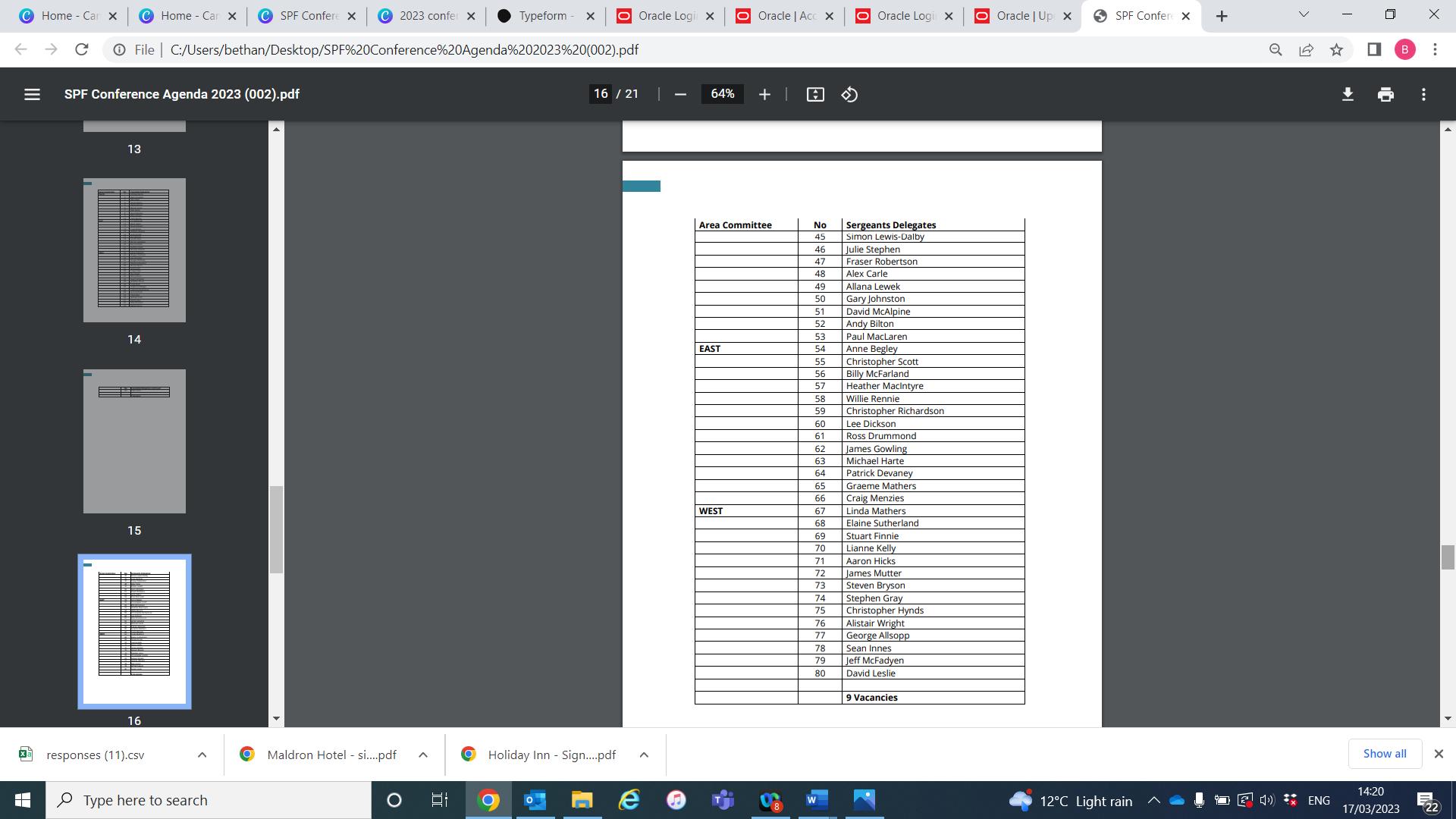
21
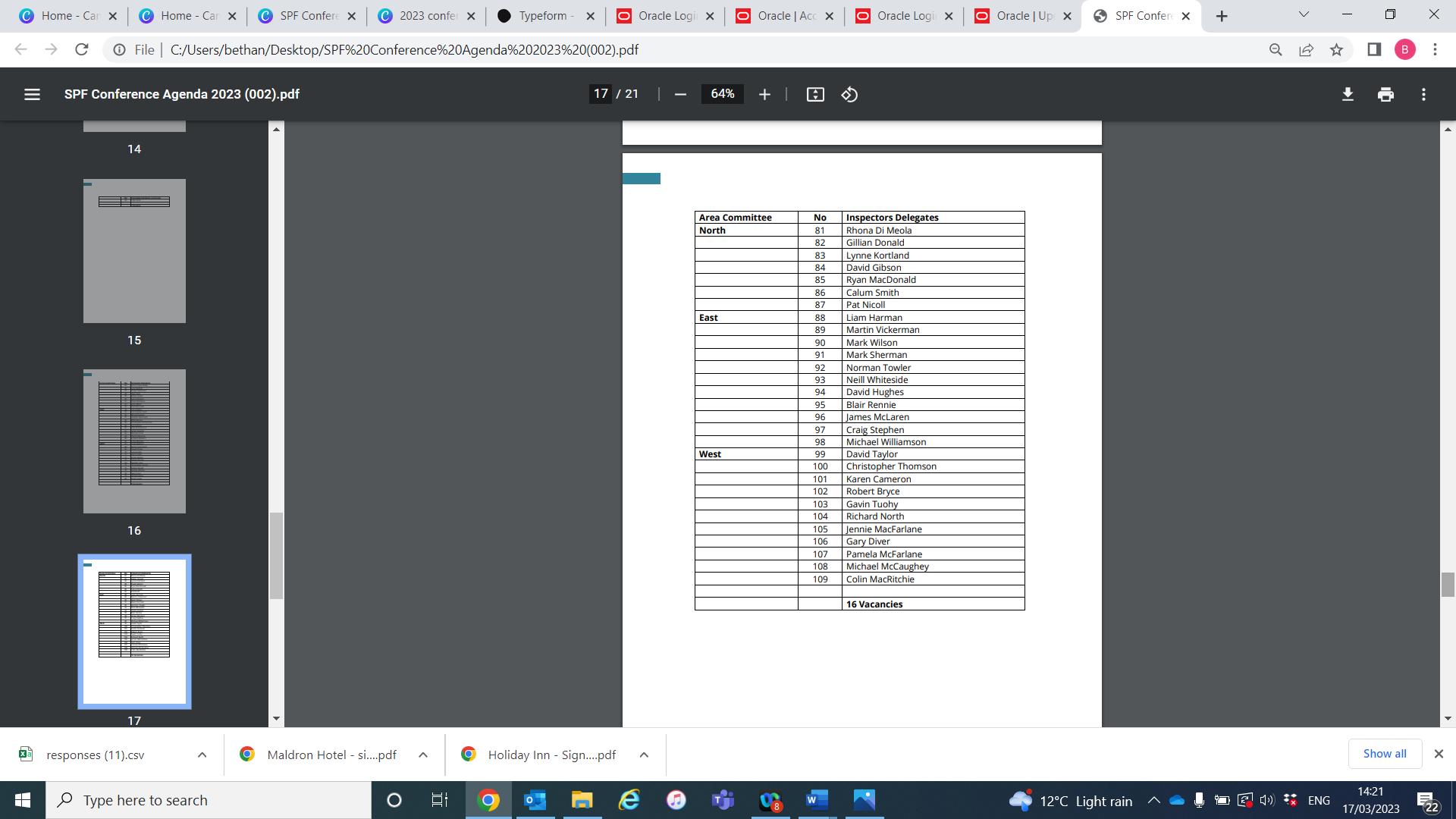
22
CHAIR’S OF THE JOINT CENTRAL COMMITTEE SINCE 1919
1919-20 Peter McAusland, Edinburgh
1920 Edward Malcolm, Aberdeenshire
1920-21 Neil Macleod, Glasgow
1921-22 John J Ryan, Glasgow (1st term of office)
1922-23 George Kay, Ayrshire
1923-24 John J Ryan, Glasgow (2nd term of office)
1924-25 William Webster, OBE, Edinburgh
1925-27 John J Ryan, Glasgow (3rd term of office)
1927-30 Arthur McIntosh, Glasgow
1930-32 John J Ryan, Glasgow (4th term of office)
1932-33 William Cowie, BL, Glasgow (1st term of office)
1933 Alexander Alexander, Glasgow
1933-34 John B Rothney, Aberdeenshire

1934-39 William Cowie, BL, Glasgow (2nd term of office)
1939-42 Thomas O Porter, Wigtownshire
1942-44 Andrew K Robertson, Glasgow
1944-46 Robert Allan, BEM, Ayrshire
1946-47 Archibald Carswell, Argyll
1947-49 William Mortimer, Aberdeen City
1949-50 George Watson, Ayr Burgh
1950-54 James Spowart, BEM, Perthshire & Kinross-shire
1954-56 James L Murchie, Glasgow
1956-57 John D Stephen, Edinburgh
23
Continued....
1957-58 Thomas McCallum, Berwick, Roxburgh & Selkirk
1958-61 Charles L Jack, BEM, Glasgow
1961-63 Norman Clark, Edinburgh
1963-66 Donald McCulloch, BEM, Glasgow
1966-68 John Black, BEM, Glasgow
1968-70 Stuart Waldman, Glasgow
1970-73 Ronald Munro, Fife
1973-76 Donald McLean, Glasgow/Strathclyde
1976-78 Frederick Conner, BEM, Lothian & Borders
1978-81 Hamish Forrest, MBE, Strathclyde
1981-82 John Hamilton, Strathclyde
1982-84 Patrick Kennedy, Strathclyde
1984-87 Alistair W A Wallace, MBE, Strathclyde
1988-89 Kenneth MacDonald, Lothian & Borders
1989-91 Elizabeth Stewart, Strathclyde
1991-00 James Fraser, QPM, Strathclyde

2000-09 Norrie Flowers, Strathclyde
2010-12
2012-16
2017- 20
Leslie Gray, Strathclyde
Brian Docherty, Strathclyde/West Area
Andrea MacDonald MSc BA, West Area
2020 - 2023 David Hamilton BEng, North Area
2023 - David Threadgold, North Area
Footnote: John J Ryan, Glasgow served four terms of office as Chairman
William Cowie, BL, Glasgow served two terms of office as Chairman.
24
GENERAL SECRETARIES OF THE JOINT CENTRAL COMMITTEE SINCE 1919
1919-22
1922-24
1924-26
1926-28
1928-30
1930-34
WilliamWebster,OBE,Edinburgh(1sttermofoffice)
JohnBCraib,MBE,AyrBurgh
WilliamCowie,BL,Glasgow
AndrewValentine,Midlothian
WilliamWebster,OBE,Edinburgh(2ndtermofoffice)
GeorgeMachray,Edinburgh
1934- RobertWatson,Edinburgh
1934-41
1941-42
1942-51
1951-56
1956-63
1963-75
1975-83
1983-87
1988-91
1991-05
2005-08
2008-23
WilliamBrander,Glasgow
WilliamForgie,MA,Glasgow
GeorgeMitchell,BEM,Coatbridge
JamesWatson,Glasgow
RobertMcClement,Glasgow
DanielWilson,MBE,ScottishNorth-EasternCountiesConstabulary

JosephBlack,MBE,Strathclyde
AlexanderGowl,Grampian
AlistairWAWallace,MBE,Strathclyde
DouglasJKeil,MBE,QPM,Grampian
JoeGrant,MBE,Strathclyde
CalumSteele,Northern/NorthArea
2023- DavidKennedy,Strathclyde/WestArea
Footnote:WilliamWebster,OBE,EdinburghservedtwotermsofofficeasSecretary
Thisisthe98thCentralConference;thesehavebeenheldannuallysince1919,exceptforthe year1939whennoconferencewasheldowingtowarconditions;also1950owingtothepassing ofanamendmenttothePoliceAct,1919toallowtheconferencemonthtobechangedfrom NovembertoApril.In2013adecisionwastakentomovefromAnnualtoBiennialConferences.
25
2023 Speaker Biographies
Craig Sandison, The Hon Lord Sandison
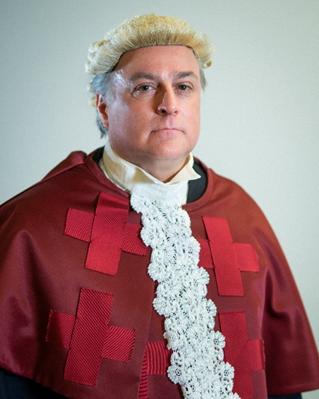
Lord Sandison is a graduate of the Universities of Aberdeen and Cambridge (holding a PhD in criminal law from the latter) and further holds diplomas from the Universities of Edinburgh and Glasgow. He was admitted to the Faculty of Advocates in 1996, and was appointed Queen’s Counsel in 2009. He has been a Senator of the College of Justice since 2021 Prior to becoming a judge in the Court of Session and the High Court of Justiciary, Lord Sandison was frequently instructed on behalf of the Scottish Police Federation to represent the interests of police officers in the Court of Session and the Investigatory Powers Tribunal
.
Dr Marshall Garrett
Dr Marshall Garrett is an ex- UK Airbourne and Special Forces Medical Officer who is currently an Independent Medicolegal Expert for over 30 years and Medicolegal advisor to University of Glasgow Medical School
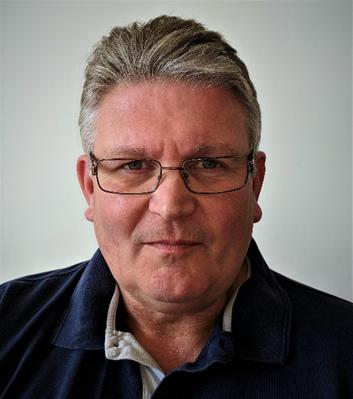
Dr Garrett is an Honorary Clinical Senior Lecturer in Medicolegal Medicine at the University of Glasgow and an Honarary Contributing Senior Lecturer in Forensic Medicine (Blast and Gunshot Wounds) Dr Garrett is passionate about mitigating risk of Head Injuries in Sport and Forces/Emergency Personnel

26
2023 Speaker Biographies
Professor Sir Harry Burns
Sir Harry Burns is Professor of Global Public Health and Chair of the Centre for Health Policy at the University of Strathclyde.As the former Chief Medical Officer for Scotland (2005 – 2014), Harry is known for his work in tackling health inequalities. Harry brings a wealth of expertise in shaping public health and health policy and advises Scottish Government, public agencies and charity funders in Scotland, UK and internationally (including Australia, Greece, New Zealand, USA)
Ken Pennington
Ken Pennington is a retired Superintendent Police, Northern Ireland and an independent consultant on policing, counter-terrorism and human rights He has vast experience in counter-terrorism and securityrelated issues and has been honoured with the Queen Jubilee award
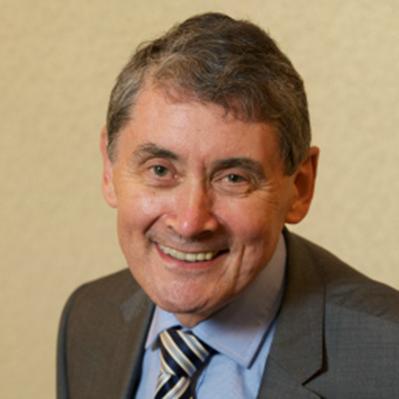
Ken has served as Commander of Counter Terrorism and Public Order. He has studied many counterterrorism courses, including the course of Counter Terrorism and Politics from St. Andrews University. Ken has also participated in many international forums on the issue of global terrorism and conducted high level research on world’s top terrorist organisations.
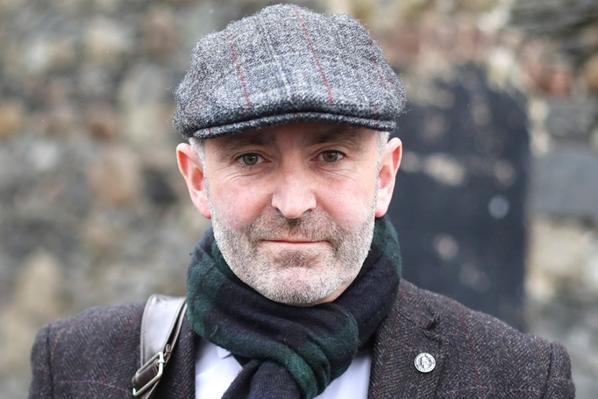

27
.
2023 Speaker Biographies
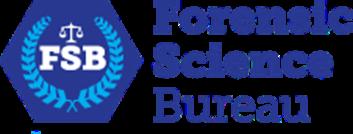
John Kennedy
John Kennedy was a Consultant Forensic Scientist at the Government-owned Forensic Science Service (FSS) before becoming Head of Digital Forensics at Key Forensic Services. John is currently the Managing Director of the Forensic Science Bureau Limited where he specialises in the Forensic Analysis and Interpretation of CCTV imagery.
He has attended as a guest speaker at the National FBI Academy in Quantico, at the University of Indianapolis Forensic Video Analysis Training Lab and at Law Enforcement training and development conferences in Washington State, Washington DC, San Francisco, Boston, Chicago and San Diego. He is a member of the International Association of Chiefs of Police (IACP) and has sat on their Advisory Panel for Digital Evidence for Public Safety. He is a professional member of the Chartered Society of Forensic Sciences.

. 28
















